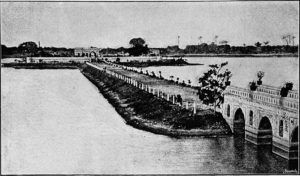
Kankaria Lake 1891
Tuesday morning, Feb’y 15, 7:30. Just got up, had bath & on looking at my morning text book, I note it is father’s[1] birthday, so I here & in spirit with him, & you all, wish him God’s blessings, & that he may be spared to see many more. Local time 9:50. I’ve had a very interesting ride since I wrote the above few lines. I got a gharry & drove to the very celebrated “Kankeria Tank”,[2] a wonderful construction & covers a great area. There [2:23] is a beautiful structure in the middle laid out with ornamental gardens & approached by a very fine road, & all along the path on each side were beautiful plants & fine shrubs & trees, & being a very lovely morning, the scenery was very pretty. Many natives about & several on the tank sides, which are built & steps down to the water edge the whole circle, were washing themselves & leisurely enjoying it. Monkeys in great numbers playing about & beneath the trees & they were amusing. Females with the baby underneath running about as we approached them. Some were very big animals, but apparently quite familiar. I passed some beautiful tombs but did not stop to examine these as I wanted to be back by 9 for breakfast & secure my berth in the car, & I write this now in it while waiting departure 10:30. I’ve a long journey before me but I hope to enjoy it. My travelling companion is the Consul General of the US of Constantinople. The cars are narrow but comfortable. Width I should say, inside, a little larger than your trains, lavatory like the Midland cars. I slept well last night & feel rested. Now you can get much detail of the places I mention if you consult the encyclopedia & map of India contained therein. Passing towards the tank this morning we drove through a market: open streets full of bullock carts laden with wood, there were [2:24] hundreds. The wood traffic hereabouts is very large. There are 26 big cotton mills on the Manchester system, native owned, & the fuel is wood. It was a great sight, also a great place for donkeys & goats, droves of both frequently to be seen & poor, poor creatures they are. Yesterday I saw many camels but so far not a single elephant.
By the way, I omitted to note that I went to the Kirk service at Bombay, the same church as the previous Sunday, a better congregation, there being many young soldiers & young people. The previous Sunday was communion, I told you, & that might account for the lesser numbers, tho’ there were many there. The minister, Mackay, read everything: prayers & sermon, quite a litany, & a very dull, heavy man & preacher. Mr. Maine, who conducted me through the Mint, (an Aberdonian[3]) came to me at the close & had a few minutes conversation. Mr. Gordon saw me off, having beforehand kindly secured me my berth, which was duly labelled. I feel quite bewildered with the native habits, & conditions under which they seem to live & hope to describe much to you when home.[4]
[2:25]
[1] William’s Father, Andrew Whitehead, died February 26, 1898.
[2] An artificial lake, also known as Kankaria Lake or Qutb Hauz.
[3] “From Aberdeen, Scotland”
[4] Inserted on facing page: “Copy of uncle’s register & inscription:
Died 1860 July 13, Robert Gibson, 43, engineer, EIR. Buried 1860 July 14. Heat apoplexy Wm. Spence, chaplain.
Copy of inscription of the memorial stone:
Sacred to the memory of Robert Gibson, marine engineer, late of Newcastle on Tyne. Died 13 July 1860 aged 45 Years. This stone is erected by his friends as a token of their respect.”